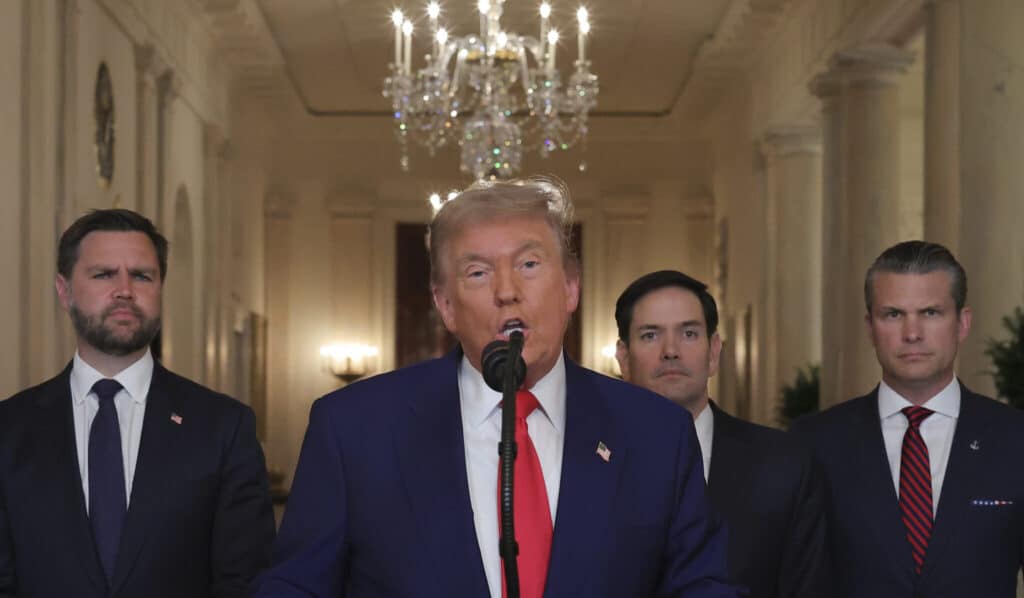In the days leading up to a dramatic escalation, Iran had already issued a stark warning about the potential consequences if the United States were to launch any attack. That warning was put to the test when President Donald Trump authorized a powerful series of airstrikes targeting Iran’s nuclear infrastructure.
On Saturday, following days of rising tensions and back-and-forth strikes between Israel and Iran, Trump gave the green light for the first direct U.S. military involvement. According to reports, 125 U.S. aircraft flew more than 7,000 miles to carry out a coordinated bombing mission on three of Iran’s critical nuclear facilities.
“The U.S. military executed precision strikes on the three key nuclear assemblies within the Iranian regime: Fordo, Natanz, and Isfahan,” Trump announced in a televised address to the nation.

He didn’t mince words about the mission’s purpose: “Our objective was to destroy Iran’s nuclear enrichment capability and eliminate the nuclear threat posed by the world’s number one state sponsor of terror.”
As expected, Trump took to social media shortly afterward, boasting of the operation’s success. He praised the joint efforts of the U.S. and Israel, declaring that they had operated “as a team perhaps like no team has ever worked before.”
However, Trump’s message didn’t end with celebration. He issued a stern and chilling warning to Tehran: any retaliation, he said, would be met with “force far greater” than what had already been unleashed.
Standing in the White House on June 21, 2025, flanked by Vice President JD Vance, Secretary of State Marco Rubio, and Defense Secretary Pete Hegseth, Trump once again addressed the nation. The imagery was clear—this was a show of strength intended not just for the American public, but for the world to see.
Now, Iran faces a difficult decision: whether to absorb the blow and avoid further conflict, or respond with the retaliation they had previously vowed. From a neutral perspective, doing nothing may seem like the wiser move—any escalation could make them an even bigger target for future U.S. strikes. But the pressure to respond is immense, both politically and publicly, especially after their earlier threats of retaliation.
NBC News reported that Iran had privately conveyed to Trump—via intermediaries at last week’s G7 summit in Canada—that any attack by the U.S. would trigger activation of so-called “sleeper cell” operatives within America itself. These sleeper cells, described by The Independent, are agents embedded in society who live seemingly ordinary lives, waiting quietly until they receive orders to strike.
Where or when such operatives might act remains unknown. But the mere suggestion has put authorities on edge, particularly in New York City, where officials have shifted into a state of heightened vigilance.
“There are no specific threats at this time,” New York City Mayor Eric Adams stated, “but we are always mindful of lone wolves.” Law enforcement has reportedly ramped up security at locations tied to Jewish and Persian communities, as well as highly trafficked tourist destinations like Times Square.
Meanwhile, Iran’s response to the U.S. airstrikes was swift and furious. Seyed Abbas Araghchi, Iran’s Foreign Minister, condemned the attack in a scathing social media post.
“The U.S. committed a grave violation of the UN Charter, international law, and the NPT by attacking Iran’s peaceful nuclear installations,” he wrote. “The events this morning are outrageous and will have everlasting consequences. Every member of the UN should be alarmed by this extremely dangerous, lawless, and criminal behavior.”
The world now waits to see what path Iran will take. Will they retaliate as promised, or pull back to avoid further escalation? The stakes are dangerously high, and one wrong move could spiral into a much broader conflict.
What’s your take on the U.S. airstrikes against Iran? Share your thoughts in the comments below.





